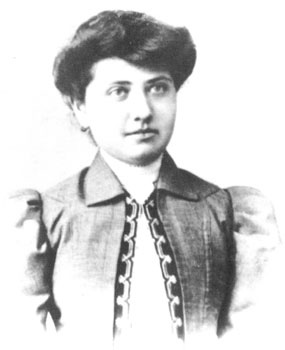| 2. My Mother and My Father | ||
|
Since my father remained without a job and without any income, my mother shouldered the responsibility for the family's economic survival. Although her acquaintance with milk had until then been restricted to her cup of coffee, she decided to open a dairy business to provide the town's Jewish families with kosher milk and dairy products. This required surveillance of the milking process by a Jewish person to make sure that udders were washed at the start and to prevent the dry ones from being smeared with pork fat, a common practice on farms in those days. While we, the bigger children, performed this job, we also had to be wary of some farmers' attempts to dilute the pails with water. The farmers and their wives were unhappy with our presence and what they termed our nosiness, but we insisted. It was a constant battle, but we prevailed and they respected the original agreement.
This responsible and often difficult task shaped and colored our entire childhood and teenage years. We had to rise at dawn each day to bring the milk home, get cleaned up, and be done with breakfast so we could be in school at precisely 8am . On our way to and from the farms at the outskirts of town, carrying milk containers each with the capacity of up to 11 liters, the gentile neighborhood children did not exactly welcome us. Some of them cast stones and ugly nicknames at us and amused themselves by setting their dogs at us. At dusk, the attacks we endured were the same, if not worse. We also had to deliver milk to the doors of customers who were unable to fetch it themselves. Planning milk distribution and processing the surplus into dairy by-products (cheese and butter) was the job and care of my mother, Elsa, who performed these tasks in addition to her household chores. When I remember how that gentle and fragile woman, who gave birth to eight healthy children within 15 years, carried such burdens upon her narrow shoulders, my heart melts with endless love and adoration. When we came home on Fridays after the evening prayer and sat down around the prepared dinner table, we sang the hymn of welcome to the Shabbat Angels and continued by reciting the “Praise of the Woman of Valour” from the Book of Proverbs:
All of us around the table were convinced that these verses of praise had been composed specifically to describe our beloved Mother, who was sitting there among us, clad in her Shabbat dress with her sweet unforgettable smile. This solemn image rests in my heart and has made my memory of our Shabbat Eves ever so precious. My father, as a born pedagogue, did not give up teaching altogether. Besides teaching the Alef-Bet (the Hebrew alphabet) to his eight children, he always accepted children who had difficulties learning to read, especially in our crowded classes. Nowadays learning disabilities get special attention, but in our times dyslects were called dummies, who were often punished for transposing letters in a word. These unfortunates were sent to Weisz Bácsi (Uncle Weiss), whom no pupil ever left without having mastered the art of reading. Still nowadays I meet people who admit that they owe their literacy to him. Of all teachers they remember Weisz-Bácsi and how his "tricks" coaxed them into intimate acquaintance with the letters. Modern psychologists would call his method “positive reinforcement.” Above the table at which he taught, he suspended a white glass bowl filled with brilliantly colored pieces of glass, which hid a few fancily wrapped candies. He told his pupils that the color glass inserts were the eyes of a little angel who was watching their progress who, if they read correctly, would drop a candy for them. I can still see those children, partly believing, partly doubtful, but always happy, both for the prize and their academic success. I am not sure whether or not naïve children believed the story, but I remember that it worked for me. It inspired me to do my very best, and I was ecstatic when I opened my eyes after hearing the sound of something dropping onto the table and finding, the longed for "heavenly" gift! I have detailed this story at length, because those difficult students are mature adults today, in their seventies or eighties, who still remember with love and adoration their one-time tutor who saved them from the embarrassment of illiteracy over 70 years ago. My father taught us much more than reading Hebrew, each of us
in turn at the proper age. Since he did not trust the pedagogical
abilities of his successor, the Melamed, he did not send
us to that Talmud Torah institute but rather taught us
the Khumash, the Pentateuch, himself. He wanted it translated
into German, not into Yiddish as was habitual in the Talmud
Torah. He believed that a German translation could render
the text more exactly, besides teaching us two difficult languages,
Hebrew and German, simultaneously. This was no easy task for us,
because Papa demanded an exact translation according to the rules
of the complex German grammar, but in retrospect I treasure every
minute of this hard study. I am very thankful to my father for
investing so much time, energy and endless love in our education.
It makes me happy to remember that he also enjoyed his success
when we recited the translation perfectly without error. I am convinced
that this study has sown the first seeds of my interest in, and
attraction to, the Bible in general and the Pentateuch in particular.
It also gave me a solid basis for mastering Ivrit—modern
Hebrew as spoken in Israel. |
||
